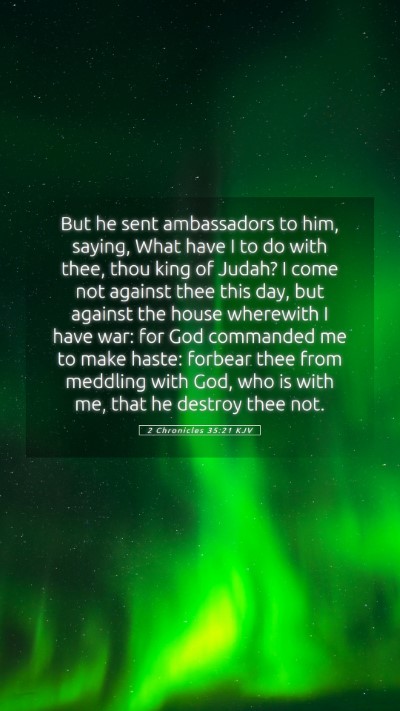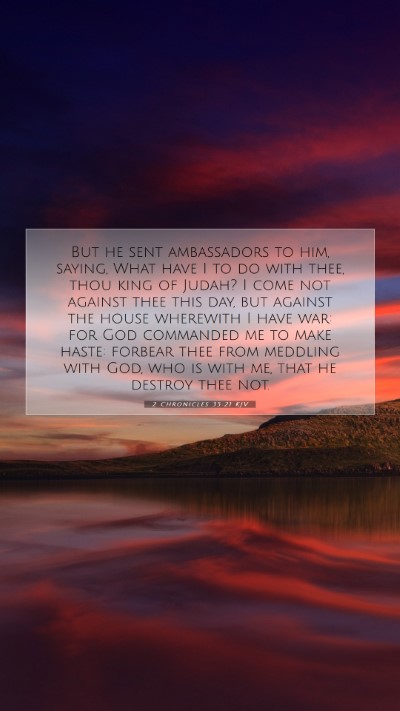Understanding 2 Chronicles 35:21
The verse 2 Chronicles 35:21 states:
"But he sent ambassadors to him, saying, What have I to do with thee, thou king of Judah? I come not against thee this day, but against the house wherewith I have war: for God commanded me to make haste: forbear thee from meddling with God, who is with me, that he destroy thee not."
Context and Background
This verse occurs in the context of King Josiah’s reign over Judah, a time characterized by significant religious reform and attempts to follow God's commandments faithfully. The events of this chapter focus on Josiah's observance of the Passover and his efforts to restore the temple worship as prescribed in the Law of Moses.
Historical Context
At this time, the kingdom of Judah was under threat from Egypt, specifically from Pharaoh Necho II, who was on his way to battle against the Assyrians. Josiah, known for his piety and efforts to steer the people back to Yahweh, is confronted with a choice—engage in a conflict that he is not directly involved in or heed the warning delivered to him.
Bible Verse Meaning
The meaning of this verse revolves around the themes of divine command, intervention, and the importance of heeding God’s warnings. Josiah, representing Judah, receives a message from Pharaoh, warning him not to interfere in the impending conflict.
Divine Authority and Obedience
According to Matthew Henry’s commentary, Pharaoh emphasizes that he acts on divine orders, indicating that God had commanded him to move swiftly against a common enemy. This introduces the concept of God working through other nations, even those with a largely pagan background, demonstrating that divine will transcends human understanding and political boundaries.
Warnings Against Meddling
Albert Barnes points out Pharaoh's admonition to Josiah against meddling with the affairs of God. This is a vital instruction, illustrating that Josiah should not presume to understand God's plans. It serves as a reminder that often, the purposes of God may align with interests beyond our immediate perception, and to act against what appears as divine will can lead to disastrous consequences.
The Role of Prophecy and Divine Messengers
Adam Clarke adds depth by highlighting the role of prophets and divine messengers in conveying God's intentions. Josiah’s desperate need for direction in acting righteously amid conflict encapsulates the importance of prophetic guidance. It reveals the necessity of discernment in understanding the true voice of God amidst competing messages.
Biblical Exegesis
The excerpt invites deeper analysis into how to interpret Bible verses like this one, raising essential questions about our understanding of God’s communication through divinely appointed leaders and nations. It stresses the relevance of understanding Scripture in its historical and cultural context.
- Reflection on Authority: The verse can prompt believers to reflect on the authority of God and His sovereign decisions through individuals and nations.
- Discernment: It brings forward a need for discretion in making choices, particularly regarding spiritual matters that may affect others.
- Spiritual Warfare: The conflict is symbolic of spiritual warfare where believers must understand their battles are not merely physical but deeply spiritual.
Application of the Verse
This verse encourages individuals to apply wisdom and spiritual insight in their lives, advising against overstepping our bounds as believers. The conflict serves as a powerful metaphor for the struggles Christians face when encountering forces contrary to their faith.
Daily Life Integration
Practically, when facing situations requiring urgency or reaction, reflecting on this verse reminds us to consult God through prayer and scriptural engagement, ensuring our steps align with His will and purpose.
Cross References
- 2 Kings 23:29-30: The death of Josiah and its implications.
- Jeremiah 22:10: A lament for the fallen kings of Judah and their avoidance of God's voice.
- Isaiah 36:2: The Assyrian threats highlight ongoing national conflicts during Josiah's reign.
Conclusion
In summary, 2 Chronicles 35:21 serves as a vital lesson in humility, discernment, and reverence for divine authority. It encourages believers today to seek God’s guidance earnestly, preparing themselves to align actions with His overarching plans. This verse illustrates the importance of humility in leadership and the need for clear communication and understanding of God’s will.
The analysis provided sheds light on how to interpret Bible verses, emphasizing the relevance of ancient texts to modern believers' lives and the importance of seeking deeper meanings through Bible study resources and tools.


